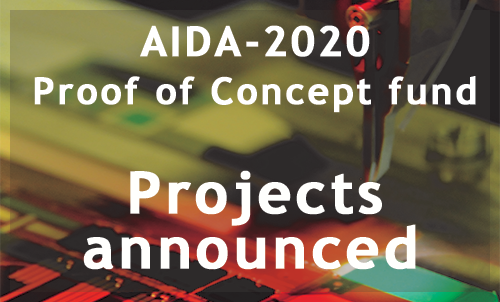
Proof-of-Concept fund announces successful applicants
Jennifer Toes (CERN), 28/02/2017

The AIDA-2020 Proof-of-Concept fund has selected three projects to receive funding to develop spin-off detector technologies.
As part of its efforts to encourage innovation with societal impacts, AIDA-2020 created the PoC fund with the aim of providing funds to a maximum of four industry-oriented projects for the research and development of spin-off technologies. The total budget of fund was €200,000
Applicants were encouraged to demonstrate the potential market pull of their chosen technologies by partnering with a member of industry.
The call for proposals was opened at the first AIDA-2020 Annual Meeting in Hamburg in June 2016, and the call closed in October. The fund received a total of 11 valid proposals, which requested a total combined budget of over €1 million –exceeding the total amount of funding available five-fold.
A panel selected by the AIDA-2020 Steering Committee evaluated the proposals and invited applicants to interview before selecting the successful three projects. The projects are listed below in no particular order:
The first is titled “Silicon-based microdosimetry system for advanced radiation therapies,” proposed by Instituto de Microelectronica de Barcelona. The project aims to develop a tool optimised for a clinical setting using silicon microsensors and multi-channel read-out electronics for use in anti-cancer treatments.
The second project is “Advances through silicon vias for pixel detectors”, led by the University of Bonn, and partnering with Fraunhofer IZM. The project plans to demonstrate the feasibility of very thin readout chips with Through Silicon Vias (TSVs) in hybrid-pixel detectors. This has promising application potential in the fields of imaging sensors from the infra-red to the X-ray domain, heterogenous integration of memories and processors, or hermetic encapsulation of sensors.
The final successful applicant is the “RaDoM” project, lead by CERN in conjunction with Politecnico di Milano and Mi.am. This project aims to develop new hardware and software for combatting the health risks of radon under the requirements of the Swiss “National Action Plan concerning Radon 2012-2020”.
